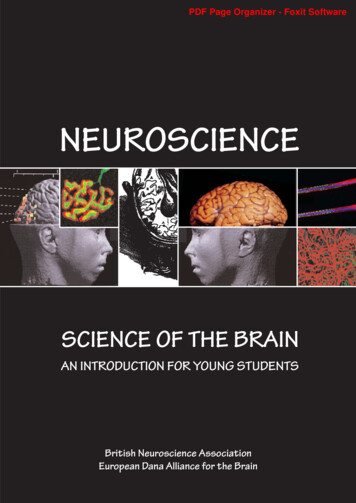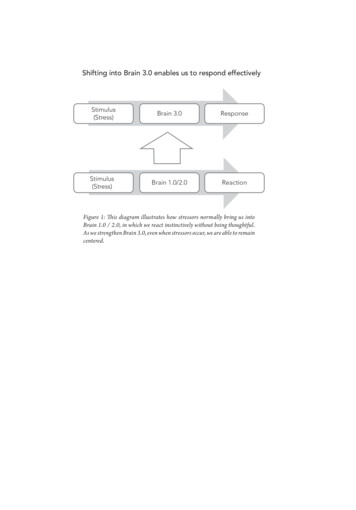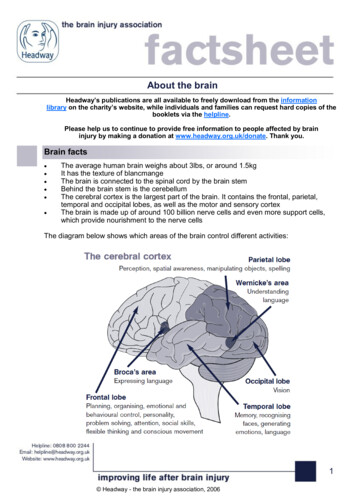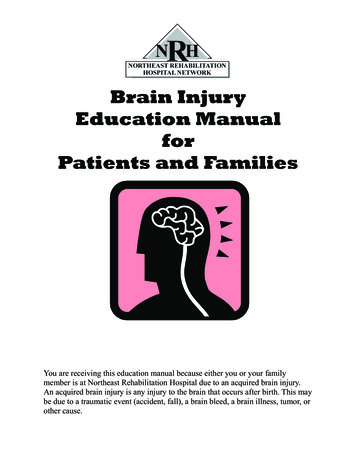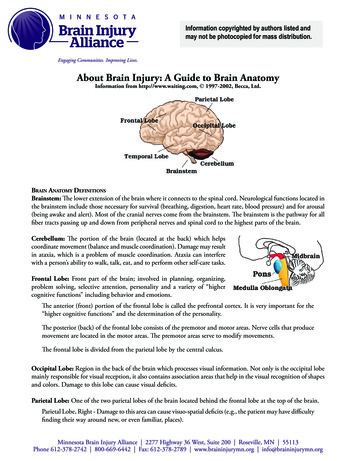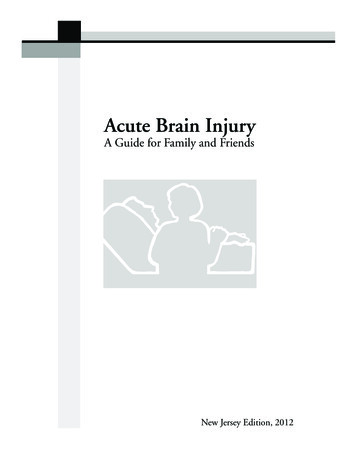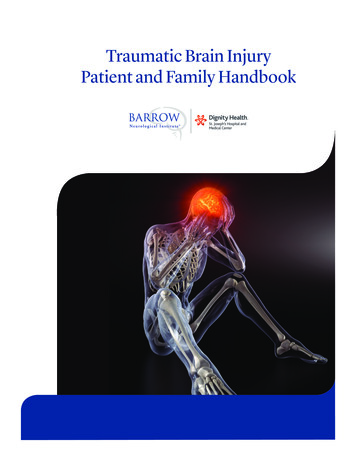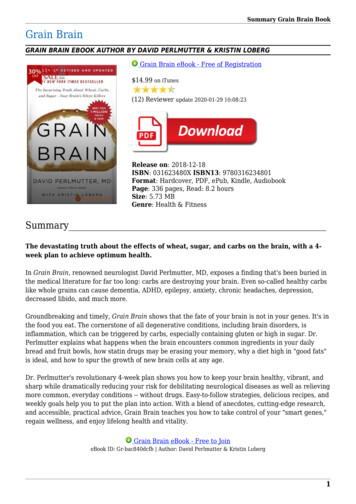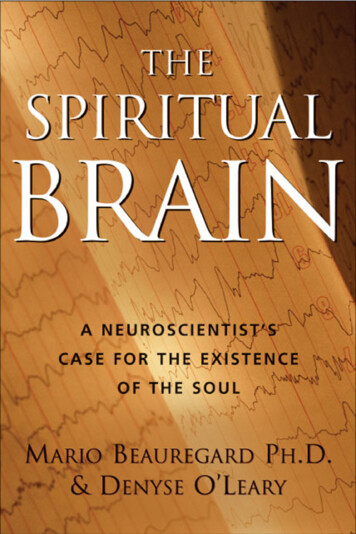
Transcription
THESPIRITUALBRAINA Neuroscientist’s Case for the Existence of the SoulMARIO BEAUREGARDandDENYSE O’LEARY
ContentsAcknowledgmentsIntroductionvviioneToward a Spiritual NeurosciencetwoIs There a God Program?41Does the God Module Even Exist?57The Strange Case of the God Helmet79t h re efo u rfivesixse ve neigh tnineten1Are Mind and Brain Identical?101Toward a Nonmaterialist Science of Mind125Who Has Mystical Experiences andWhat Triggers Them?181Do Religious, Spiritual, or Mystical ExperiencesChange Lives?229The Carmelite Studies: A New Direction?255Did God Create the Brain orDoes the Brain Create God?289Notes297Glossary343Bibliography349Index359
About the AuthorsCreditsCoverCopyrightAbout the Publisher
AcknowledgmentsI am very grateful to my doctoral students Johanne Lévesque, ÉlisabethPerreau-Linck, and Vincent Paquette, whose brain-imaging studies arepresented in this book.Also due acknowledgment are the Natural Sciences and EngineeringResearch Council of Canada (NSERC), the Metanexus Institute, and theJohn Templeton Foundation, without whose financial support the Carmelite studies could not have been conducted.Susan Arellano, our literary agent, deserves our gratitude for her greatefficiency.Both of us wish to thank Eric Brandt, our editor at HarperOne, for hiswise editorial suggestions, as well as production editor Laurie Dunne andcopyeditor Ann Moru for their skill, patience, and understanding. Wewould also like to acknowledge the work of Pierre-Alexandre Lévesque onthe visuals of the human brain.Last, I want to thank my wife, Johanne, and my children, Audrey andMarc-Antoine, for their love and understanding.Mario BeauregardI wish to acknowledge my father, John Patrick O’Leary, who has maintained an interest in the central ideas of civilization all his life, encouragingme in this and all such projects, and my mother, Blanche O’Leary, who hasnever once complained about the difficulties of living with a writer while abook is in progress, and who has been an immense, incalculable help.Denyse O’Leary
IntroductionWhen my doctoral student Vincent Paquette and I first began studyingthe spiritual experiences of Carmelite nuns at the Université de Montréal,we knew that our motives were quite likely to be misunderstood.First, we had to convince the nuns that we were not trying to prove thattheir religious experiences did not actually occur, that they were delusions,or that a brain glitch explained them. Then we had to quiet both thehopes of professional atheists and the fears of clergy about the possibilitythat we were trying to reduce these experiences to some kind of “Godswitch” in the brain.Many neuroscientists want to do just that. But Vincent and I belong toa minority—nonmaterialist neuroscientists. Most scientists today are materialists who believe that the physical world is the only reality. Absolutelyeverything else—including thought, feeling, mind, and will—can be explained in terms of matter and physical phenomena, leaving no room forthe possibility that religious and spiritual experiences are anything but illusions. Materialists are like Charles Dickens’s character EbeneezerScrooge who dismisses his experience of Marley’s ghost as merely “an undigested bit of beef, a blot of mustard, a crumb of cheese, a fragment of anunderdone potato.”Vincent and I, on the other hand, did not approach our research withany such materialist presumption. As we are not materialists, we did notdoubt in principle that a contemplative might contact a reality outsideherself during a mystical experience. In fact, I went into neuroscience inpart because I knew experientially that such things can indeed happen.
viiiIntroductionVincent and I simply wanted to know what the neural correlates—the activity of the neurons—during such an experience might be. Given theoverwhelming dominance of materialism in neuroscience today, we countourselves lucky that the nuns believed in our sincerity and agreed to help usand that the Templeton Foundation saw the value of funding our studies.Of course, you may well ask, can neuroscience studies of contemplativenuns demonstrate that God exists? No, but they can—and did—demonstrate that the mystical state of consciousness really exists. In this state, thecontemplative likely experiences aspects of reality that are not available inother states. These findings rule out various materialist theses that thecontemplative is faking or confabulating the experience. Vincent and Ialso showed that mystical experiences are complex—a finding that challenges a vast variety of simplistic materialist explanations such as a “Godgene,” “God spot,” or “God switch” in our brains.Toronto-based journalist Denyse O’Leary and I have written this book todiscuss the significance of these studies, and more generally, to provide a neuroscientific approach to understanding religious, spiritual, and mystical experiences. The discipline of neuroscience today is materialist. That is, it assumesthat the mind is quite simply the physical workings of the brain. To see whatthis means, consider a simple sentence: “I made up my mind to buy a bike.”One would not say, “I made up my brain to buy a bike.” By contrast, onemight say, “Bike helmets prevent brain damage,” but not “Bike helmets prevent mind damage.” But materialists think that the distinction you make between your mind as an immaterial entity and your brain as a bodily organhas no real basis. The mind is assumed to be a mere illusion generated by theworkings of the brain. Some materialists even think you should not in factuse terminology that implies that your mind exists.In this book, we intend to show you that your mind does exist, that itis not merely your brain. Your thoughts and feelings cannot be dismissedor explained away by firing synapses and physical phenomena alone. In asolely material world, “will power” or “mind over matter” are illusions,there is no such thing as purpose or meaning, there is no room for God.Yet many people have experience of these things, and we present evidencethat these experiences are real.In contrast, many materialists now argue that notions like meaning orpurpose do not correspond to reality; they are merely adaptations forhuman survival. In other words, they have no existence beyond the evolu-
Introductionixtion of circuits in our brains. As co-discoverer of the genetic code FrancisCrick writes in The Astonishing Hypothesis, “Our highly developed brains,after all, were not evolved under the pressure of discovering scientifictruths but only to enable us to be clever enough to survive and leave descendants.” But are questions about our meaning or purpose merely survival mechanisms? If such an airy dismissal of the intellectual life ofthousands of years sounds vaguely unconvincing, well, perhaps it should.Suppose, for example, a healthy man donates a kidney for free to adying stranger. The materialist may look for an analogy among moles,rats, or chimpanzees, as the best way to understand the donor’s motives.He believes that the donor’s mind can be completely explained by the hypothesis that his brain evolved slowly and painstakingly from the brains ofcreatures like these. Therefore, his mind is merely an illusion created bythe workings of an overdeveloped brain, and his consciousness of his situation is actually irrelevant as an explanation of his actions.This book argues that the fact that the human brain evolves does notshow that the human mind can be dismissed in this way. Rather, thehuman brain can enable a human mind, whereas the mole brain cannot(with my apologies to the mole species). The brain, however, is not themind; it is an organ suitable for connecting a mind to the rest of the universe. By analogy, Olympic swimming events require an Olympic classswimming pool. But the pool does not create the Olympic events; itmakes them feasible at a given location.From the materialist perspective, our human mind’s consciousness andfree will are problems to be explained away. To see what this means, consider Harvard cognitive scientist Steven Pinker’s comments on consciousness in a recent piece in Time magazine entitled “The Mystery ofConsciousness” ( January 19, 2007). Addressing two key problems thatscientists face, he writes,Although neither problem has been solved, neuroscientists agree on manyfeatures of both of them, and the feature they find least controversial is theone that many people outside the field find the most shocking. FrancisCrick called it “the astonishing hypothesis”—the idea that our thoughts,sensations, joys and aches consist entirely of physiological activity in thetissues of the brain. Consciousness does not reside in an ethereal soul thatuses the brain like a PDA [personal digital assistant]; consciousness is theactivity of the brain.
xIntroductionGiven that Pinker admits that neither problem concerning consciousness is either solved or anywhere close to being solved, how can he be sosure that consciousness is merely “the activity of the brain,” implying thatthere is no soul?One convenient aspect of Pinker’s materialism is that any doubt can belabeled “unscientific” in principle. That preempts a discussion of materialism’s plausibility. Certainly, materialism is a faith that many intellectualswould never think of questioning. But the strength of their convictionneither shows that it is a correct account of reality nor provides evidencein its favor. A good case can be made for the opposite view, as this bookwill demonstrate.Yes, this book—departing from a general trend in books on neuroscience aimed at the general public—does question materialism. Much morethan that, it presents evidence that materialism is not true. You will see foryourself that the evidence for materialism is not nearly so good as StevenPinker would like you to believe. You can only retain your faith in materialism by assuming—on faith—that any contrary evidence you read aboutmust be wrong.For example, as we will show, a materialist readily believes—withoutany reliable evidence whatsoever—that great spiritual leaders suffer fromtemporal-lobe epilepsy rather than that they have spiritual experiences thatinspire others as well as themselves. Where spirituality is concerned, thisexperiential data is an embarrassment to narrow materialism. That is because a system like materialism is severely damaged by any evidence againstit. Consequently, data that defy materialism are simply ignored by manyscientists. For instance, materialists have conducted a running war againstpsi research (research on knowledge or action at a distance, such as extrasensory perception, telepathy, precognition, or telekinesis) for decades,because any evidence of psi’s validity, no matter how minor, is fatal to theirideological system. Recently, for example, self-professed skeptics have attacked atheist neuroscience grad student Sam Harris for having proposed,in his book entitled The End of Faith (2004), that psi research has validity.Harris is only following the evidence, as we shall see. But in doing so, he isclearly violating an important tenet of materialism: materialist ideologytrumps evidence.But other challenges to materialism exist. Materialists must believe thattheir minds are simply an illusion created by the workings of the brain
Introductionxiand therefore that free will does not really exist and could have no influence in controlling any disorder. But nonmaterialist approaches haveclearly demonstrated mental health benefits. The following are a few examples discussed in this book.Jeffrey Schwartz, a nonmaterialist UCLA neuropsychiatrist, treatsobsessive-compulsive disorder—a neuropsychiatric disease marked by distressing, intrusive, and unwanted thoughts—by getting patients to reprogram their brains. Their minds change their brains.Similarly, some of my neuroscientist colleagues at the Université deMontréal and I have demonstrated, via brain imaging techniques, thefollowing: Women and young girls can voluntarily control their level ofresponse to sad thoughts, though young girls found it more difficultto do so. Men who view erotic films are quite able to control their responsesto them, when asked to do so. People who suffer from phobias such as spider phobia canreorganize their brains so that they lose the fear.Evidence of the mind’s control over the brain is actually captured inthese studies. There is such a thing as “mind over matter.” We do have willpower, consciousness, and emotions, and combined with a sense of purpose and meaning, we can effect change.At one time, materialist explanations of religion and spirituality were atleast worth considering. For example, Sigmund Freud argued that childhood memories of a father figure led religious people to believe in God.Freud’s explanation failed because Christianity is the only major religionthat emphasizes the fatherhood of God. But his idea, while wrong, wasnot ridiculous. Relationships with fathers, happy or otherwise, are complex human experiences, with some analogies to religion. Similarly, anthropologist J. G. Frazer thought that modern religions grew out of primalfertility cults and were only later spiritualized. Actually, the evidencepoints more clearly to spiritual experiences as the source of later religiousbeliefs and rituals. Still, Frazer’s idea was far from trivial. It derived from along and deep acquaintance with ancient belief systems.
xiiIntroductionBut recently, materialistic explanations of religion and spirituality havegotten out of hand. Influenced by this materialistic prejudice, popularmedia jump at stories about the violence gene, the fat gene, the monogamygene, the infidelity gene, and now, even a God gene! The argument goes likethis: evolutionary psychologists attempt to explain human spirituality andbelief in God by insisting that cave dwellers in the remote past who believedin a supernatural reality were more likely to pass on their genes than cavedwellers who didn’t. Progress in genetics and neuroscience has encouragedsome to look, quite seriously, for such a God gene, or else a God spot,module, factor, or switch in the human brain. By the time the amazing“God helmet” (a snowmobile helmet modified with solenoids that purportedly could stimulate subjects to experience God) in Sudbury, Canada,became a magnet for science journalists in the 1990s (the Decade of theBrain), materialism was just about passing beyond parody. Nonetheless,materialists continue to search for a God switch. Such comic diversionsaside, there is no escaping the nonmaterialism of the human mind.Essentially, there is no God switch. As the studies with the Carmelitenuns have demonstrated and this book will detail, spiritual experiences arecomplex experiences, like our experiences of human relationships. Theyleave signatures in many parts of the brain. That fact is consistent with(though it does not by itself demonstrate) the notion that the experiencercontacts a reality outside herself.The fact is materialism is stalled. It neither has any useful hypothesesfor the human mind or spiritual experiences nor comes close to developing any. Just beyond lies a great realm that cannot even be entered viamaterialism, let alone explored. But the good news is that, in the absenceof materialism, there are hopeful signs that spirituality can indeed be entered and explored with modern neuroscience.Nonmaterialist neuroscience is not compelled to reject, deny, explainaway, or treat as problems all evidence that defies materialism. That ispromising because current research is turning up a growing body of suchevidence. Three examples addressed in this book are the psi effect, neardeath experiences (NDEs), and the placebo effect.The psi effect, as seen in such phenomena as extrasensory perceptionand psychokinesis, is a low-level effect, to be sure, but efforts to disconfirm it have failed. NDEs have also become a more frequent subject of research in recent years, probably because the spread of advanced
Introductionxiiiresuscitation techniques has created a much larger population that survives to recount them. As a result of the work of researchers such as Pimvan Lommel, Sam Parnia, Peter Fenwick, and Bruce Greyson, we nowhave a growing base of information. The results do not support a materialist view of mind and consciousness, as advanced by Pinker, who writesin Time “when the physiological activity of the brain ceases, as far asanyone can tell the person’s consciousness goes out of existence.”Most of us have not experienced unusual effects like psi or NDE, butwe have all probably experienced the placebo effect: have you ever gone toyour doctor to get a letter saying you can’t go to work because you have abad cold—and suddenly begun to feel better while sitting in the clinic,leafing through magazines? It’s embarrassing, but easy to explain: yourmind generates messages to begin the analgesic or healing processes whenyou accept that you have in fact started on a path to recovery. Materialistneuroscience has long regarded the placebo effect as a problem, but it isone of the best attested phenomena in medicine. But for nonmaterialistneuroscience, it is a normal effect that can be of great therapeutic valuewhen properly used.Materialism is apparently unable to answer key questions about thenature of being human and has little prospect of ever answering them intelligibly. It has also convinced millions of people that they should notseek to develop their spiritual nature because they have none.Some think that the solution is to continue to uphold materialism a bitmore raucously than before. Currently, key materialist spokespersons havelaunched a heavily publicized and somewhat puzzling “anti-God” crusade.Antitheistic works such as Breaking the Spell: Religion as a Natural Phenomenon (Daniel Dennett), The God Delusion (Richard Dawkins), God:The Failed Hypothesis—How Science Shows that God Does Not Exist (VictorJ. Stenger), God Is Not Great (Christopher Hitchens), and Letters to aChristian Nation (Sam Harris) are accompanied by conferences such asthe Science Network’s “Beyond Belief ” and campaigns such as the YouTube Blasphemy Challenge.The remarkable thing is that there isn’t a single new idea in anythingthey have to say. Eighteenth-century philosophes said it all long ago, to asmuch or little purpose. Granted, recent works have been spiced with thequestionable assumptions of evolutionary psychology—the attempt toderive religion and spirituality from the practices that may have enabled a
xivIntroductionfew of our Pleistocene ancestors to pass on their genes. But the Pleistoceneancestors are long gone, and not much can really be learned from a discipline that lacks a subject. There are also plenty of assurances about the illusory nature of mind, consciousness, and free will, and the uselessness ordanger of spirituality.A variety of experts of the mid-twentieth century had predicted thatspirituality would slowly but surely disappear. Once supplied with abundant material goods, people would just stop thinking about God. But theexperts were wrong. Spirituality today is more varied, but it is growing allover the world. Thus, its continuing vitality prompts speculations, fears,and some pretty wild guesses—but most of all, a compelling curiosity, adesire to investigate.But how can we investigate spirituality scientifically? To start with, wecan rediscover our nonmaterialist inheritance. It has always been there,just widely ignored. Famous neuroscientists such as Charles Sherrington,Wilder Penfield, and John Eccles, were not in fact reductive materialists,and they had good reasons for their position. Today, nonmaterialist neuroscience is thriving, despite the limitations imposed by widespread misunderstanding and, in a few cases, hostility. Readers are urged to approachall the questions and evidence presented in this book with an open mind.This is a time for exploration, not dogma.Our book will establish three key ideas. The nonmaterialist approachto the human mind is a rich and vital tradition that accounts for the evidence much better than the currently stalled materialist one. Second,nonmaterialist approaches to the mind result in practical benefits andtreatments, as well as promising approaches to phenomena that materialistaccounts cannot even address. Lastly—and this may be the most important value for many readers—our book shows that when spiritual experiences transform lives, the most reasonable explanation and the one thatbest accounts for all the evidence, is that the people who have such experiences have actually contacted a reality outside themselves, a reality thathas brought them closer to the real nature of the universe.Mario BeauregardMontreal, CanadaMarch 4, 2007
ONEToward a Spiritual NeuroscienceIn June 2005, the historic World Summit on Evolution was held on theremote island of San Cristobal in the Galápagos Islands, off the coast ofEcuador. The unassuming location, Frigatebird Hill, was chosen becauseit was the very spot where Charles Darwin first docked in 1835 to probethe “mystery of mysteries”—the origin and nature of species, including(and perhaps especially) the human species.These isolated Pacific islands lying on the equator later became a stopover for pirates, whalers, and sealers who drove the unique life forms thatDarwin studied to the brink of extinction. But still later, under government protection in the twentieth century, the islands evolved into a sort ofshrine to materialism—the belief that all life, including human life, ismerely a product of the blind forces of nature.1 In the materialist’s view,our “minds”—soul, spirit, free will—are simply an illusion created by theelectrical charges in the neurons of our brains. Nature is, as Oxford zoologist Richard Dawkins famously put it, a “blind watchmaker.”2The Galápagos meeting was quickly hailed as the Woodstock of Evolution. The scientists present, a “Who’s Who of evolutionary theory,”3 werewell aware of their own importance and the significance of the proceedings. “We are simply stunned to be here,” wrote one science journalist,recalling that the elite audience listened to the familiar tale of evolution“rapt, like children hearing the retelling of a favorite story.”4According to the favorite tale, human beings are merely “a bizarre tinyclade,” in the words of one attendee.5 And the mission of the next summitpromises to tell that tale to the whole world.6 However, to judge from the
2the spiritual br aingrowing dissension around the teaching of evolution, the world has heardit already.A Series of Mindless Events?A key figure at the conference was American philosopher Daniel Dennett.Dennett, who bears a striking physical resemblance to Charles Darwin, isa world-famous philosopher of mind. He is the favorite philosopher ofthose who think that computers can simulate human mental processes.Curiously, for a philosopher of mind, he hopes to convince the world thatthere isn’t really any such thing as a mind in the traditional sense. He isbest known, perhaps, for saying that “Darwin’s dangerous idea” is the bestidea anyone ever had, because it firmly grounds life in materialism. As heunderstands it, human beings are “big, fancy robots” and, better still:If you have the right sort of process and you have enough time, you cancreate big fancy things, even things with minds, out of processes which areindividually stupid, mindless, simple. Just a whole lot of little mindlessevents occurring over billions of years can create not just order, but design,not just design, but minds, eyes and brains.7Dennett insists that there is no soul or spirit associated with the humanbrain, or any supernatural element, or life after death. Thus, his careerfocus has been to explain how “meaning, function and purpose can cometo exist in a world that is intrinsically meaningless and functionless.”8 Hecame to the Galápagos to testify to that view.Of course, many people are dismayed by ideas such as Dennett’s andhope that they are false. Others welcome them as a means of freeing thehuman race from restraints imposed by traditional religions and philosophies. Let us progress, they say, toward a more humane system that bothexpects less of humans and blames them less for their failures—failuresthey can’t help anyway, really.9The question addressed in this book is not whether materialism is goodnews or bad news. Rather, the question is, does the evidence from neuroscience support it? As constitutional law professor Phillip Johnson, long afoe of materialism, which he terms “naturalism,” writes: “If the blindwatchmaker thesis is true, then naturalism deserves to rule, but I am ad-
Toward a Spiritual Neuroscience3dressing those who think the thesis is false, or at least are willing to consider the possibility that it may be false.”10True or false, materialism was the dominant intellectual current of thetwentieth century and provided the impetus for most major philosophicaland political movements of the day. Indeed, many thinkers today see theprimary purpose of science as providing evidence for materialist beliefs.They reject with hostility any scientific evidence that challenges such beliefs, as we will see in our discussion of the psi effect in Chapter Six. Everyyear, thousands of books are published, in dozens of disciplines, advancing materialist views.Not this one. This book will show that Professor Dennett and themany neuroscientists who agree with him are mistaken. It will take you ona journey different from the one he has made. Not to the Galápagos Islands, but inside the brain. It will show you why he is mistaken. In thefirst place, the materialists’ account of human beings does not bear upwell under close examination. In the second place, there is good reason forbelieving that human beings have a spiritual nature, one that even survivesdeath.But first things first. Why should you embark on this journey unlessyou see the need for a nonmaterialist account of human nature? A newaccount is needed because the materialists’ account is inadequate. It is failing in a number of areas. So let us begin by outlining some of the failures.Let’s start with this question: What would you be left with if you acceptedthe materialists’ explanation of you? Would you recognize yourself? If not,why not? What is missing?Mind, Will, Self, and SoulThe brain and its satellite glands have now been probed to the point whereno particular site remains that can reasonably be supposed to harbor anonphysical mind.11—Sociobiologist Edward O. WilsonWhy do people believe that there are dangerous implications of the ideathat the mind is a product of the brain, that the brain is organized in partby the genome, and that the genome was shaped by natural selection?12—Cognitive scientist Steven Pinker
4the spiritual br ainWhat of the mind, the will, the self, the soul? Do they have a future in thenew world of science?Dennett is far from being the only materialist thinker who argues thatthere really is no you in you at all, that consciousness, soul, spirit, and freewill are merely illusions bolstered by folklore. On the contrary, his view isin fact the standard assumption in current neuroscience. Dennett speaksfor a number of neuroscientists when he says, “a brain was always going todo what it was caused to do by current, local, mechanical circumstances.”13Your consciousness, your sense of yourself, is “like a benign ‘user-illusion.’”14Anything resembling free will is unlikely or, at best, minimal and problematic.15American culture critic Tom Wolfe put the matter succinctly in an elegant little essay he published in 1996, “Sorry, but Your Soul Just Died,”which expounds the “neuroscientific view of life.”16 He wrote about thenew imaging techniques that enable neuroscientists to see what is happening in your brain when you experience a thought or an emotion. Theoutcome, according to Wolfe, is:Since consciousness and thought are entirely physical products of yourbrain and nervous system—and since your brain arrived fully imprinted atbirth—what makes you think you have free will? Where is it going to comefrom? What “ghost,” what “mind,” what “self,” what “soul,” what anythingthat will not be immediately grabbed by those scornful quotation marks, isgoing to bubble up your brain stem to give it to you? I have heard neuroscientists theorize that, given computers of sufficient power and sophistication, it would be possible to predict the course of any human being’s lifemoment by moment, including the fact that the poor devil was about toshake his head over the very idea.17Wolfe doubts that any sixteenth-century Calvinist believed so completelyin predestination as these hot young scientists. The whole materialistcreed that Wolfe outlines hangs off one little word, “Since”—“Since consciousness and thought are entirely physical products of your brain andnervous system . . .” In other words, neuroscientists have not discoveredthat there is no you in you; they start their work with that assumption.Anything they find is interpreted on the basis of that view. The sciencedoes not require that. Rather, it is an obligation that materialists imposeon themselves.
Toward a Spiritual Neuroscience5But what if scientific evidence points in a different direction? As wewill see, it does. But before we get to the neuroscience, it may be worthwhile to look at some other reasons for thinking that the twentiethcentury materialist consensus isn’t true. Neuroscience is, after all, a rathernew discipline, and it would be best to first establish that there are alsogood reasons for doubting materialism that arise from older disciplines.What People BelieveIf materialism is true, why don’t most people believe it?In April 1966, Time magazine announced that Americans were turningtheir backs on God. Selecting Good Friday (April 8) to spread the news,the cover story asked “Is God Dead?” implying that the answer is yes. Science wa
the workings of an overdeveloped brain, and his consciousness of his situ-ation is actually irrelevant as an explanation of his actions. This book argues that the fact that the human brain evolves does not show that the human mind can be dismissed in this way. Rather, the human brain can enable a human mind, whereas the mole brain cannot
